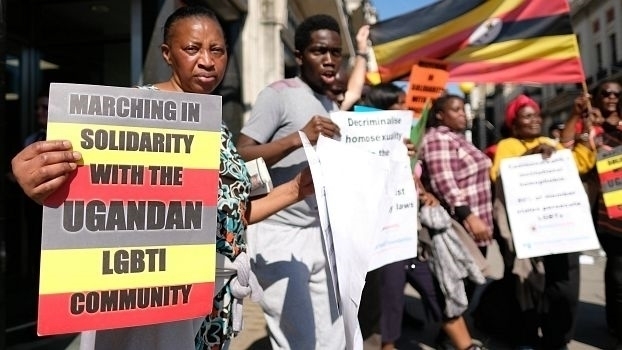
In May 2023, the "Anti-Homosexuality Act 2023" (colloquially known as the "anti-gay bill") was tightened in Uganda. Among other things, “serious homosexual acts” can now be punished with the death penalty, and people or groups who stand up for homosexuals can face up to 20 years in prison. A lawsuit filed against the law on the grounds that it violates human rights and the right to protection against discrimination and the right to privacy guaranteed by Uganda's constitution was dismissed by the Constitutional Court in April of this year, marking a new escalation of the homophobic and transphobic trend that began during the colonial era and was exacerbated by evangelical churches and politicians. Not only queer people are affected by the law, but also people and organisations that supposedly promote homosexuality or provide sex education. Since then, attacks on safe spaces, denunciations and arrests have skyrocketed.
Among other things, the coalition government has pledged to campaign for a convention on LGBTI rights at the UN. Nevertheless, the German government has so far issued hardly any humanitarian visas for affected people and human rights defenders.
One year after the adoption of the law in Uganda, the expert discussion would like to debate with activists and politicians questions such as:
- What has happened politically and socially in Uganda since last year?
- How has the situation changed for queer people and their supporters in Uganda?
- What are the implications for neighbouring countries? Is Uganda becoming a negative "reference model" in the region?
- What role do religious groups play and what influence do they have?
- Is there also a radicalising influence from Germany?
- How can solidary support be realized? What role does civil society play?
- What kind of parliamentary action should be taken?
The expert discussion is a purely virtual event. Please register for your participation under the subject "Uganda" at afrika@rosalux.org or here.
The link to the online event will be sent to you with the confirmation.
The event will take place at:
5 p.m. – 7 p.m. Central European Summer Time (CEST)
6 p.m. – 8 p.m. East African Time (EAT)
With:
- Edward Mutebi, (Let’s Walk Uganda)
- Activist Uganda, Mozambique and Kenya (anonimous for personal protection)
- Philipp Braun (Lesbian and Gay Federation LSVD / Hirschfeld-Eddy Foundation)
- Kathrin Vogler (queer policy spokesperson for DIE LINKE group in the Bundestag)
- Cornelia Möhring (Spokeswoman for Development Cooperation and Human Rights for DIE LINKE group in the Bundestag)
- Lutz van Dijk (writer, e.g. "Kampala - Hamburg")
- Moderation: Simone Schlindwein (journalist); Katrin Voß (Regional Representative, Rosa Luxemburg Foundation)
The event will be held in English with German translation.
Joint expert discussion of the RLF and the LINKE Group in the Bundestag
Contact
Dr. Andreas Bohne
Head Africa Unit, Senior Advisor North Africa, East Africa and Scientific Cooperation, Rosa-Luxemburg-Stiftung
Email: andreas.bohne@rosalux.org
Phone: +49 30 44310 521